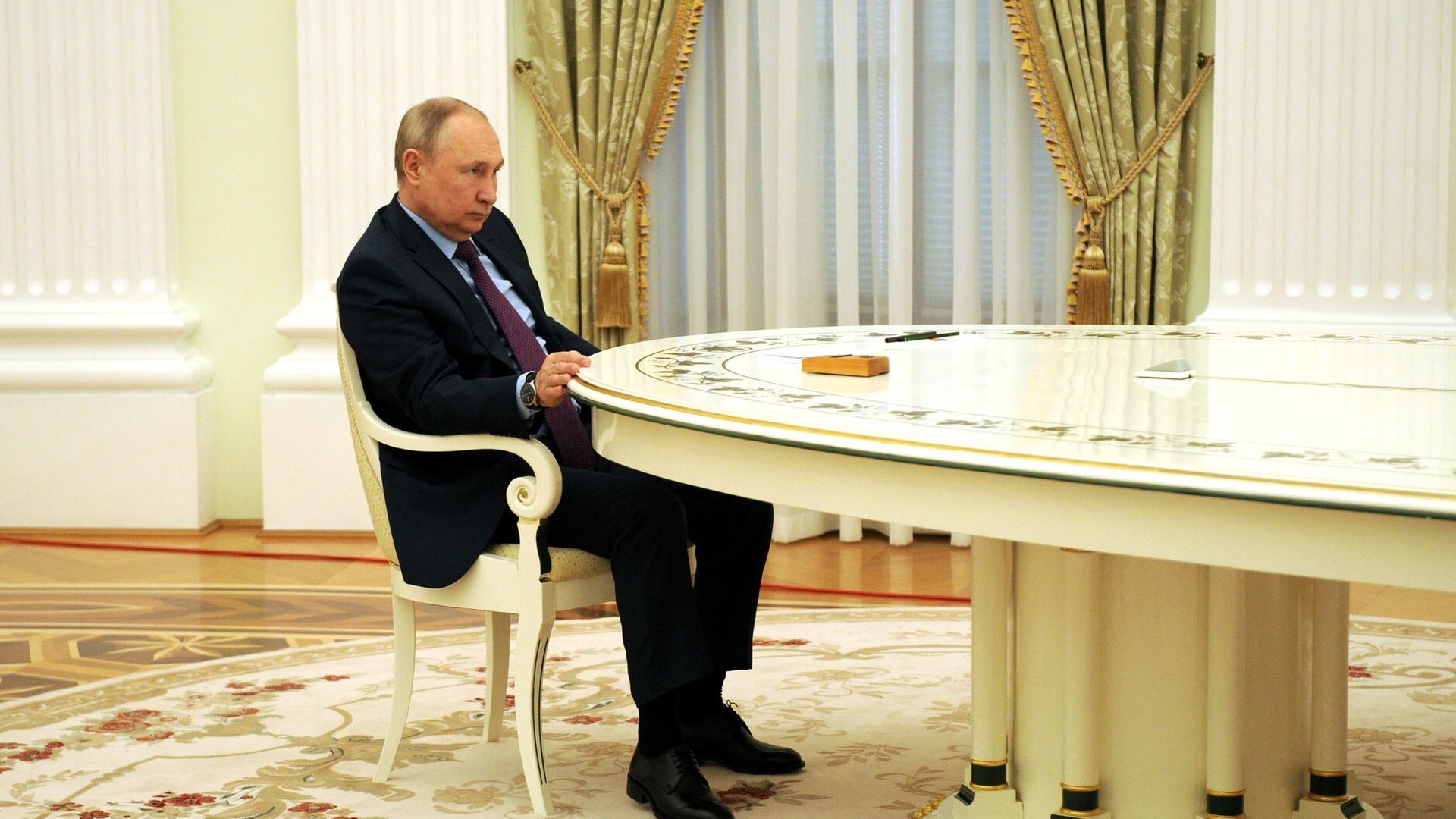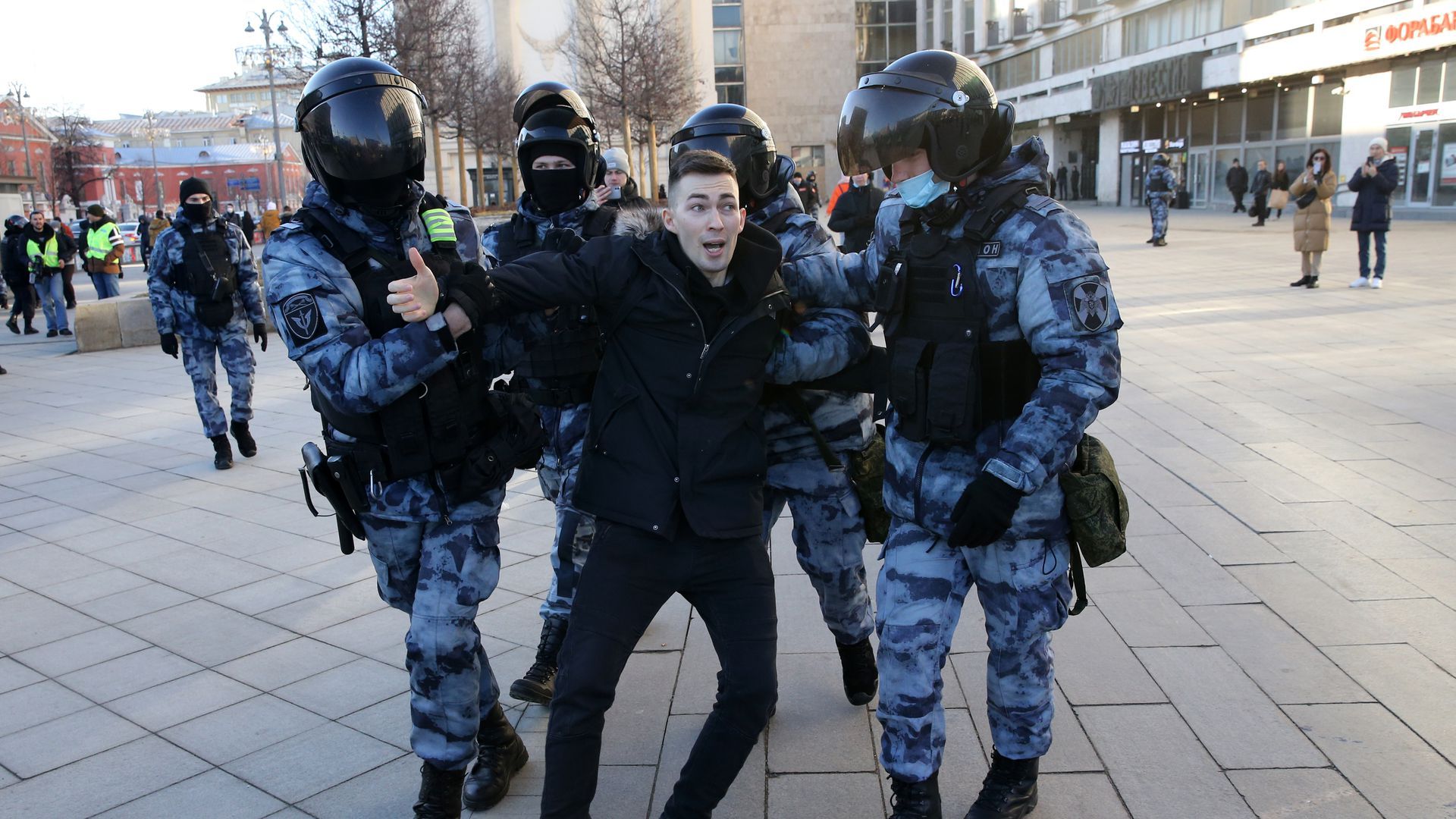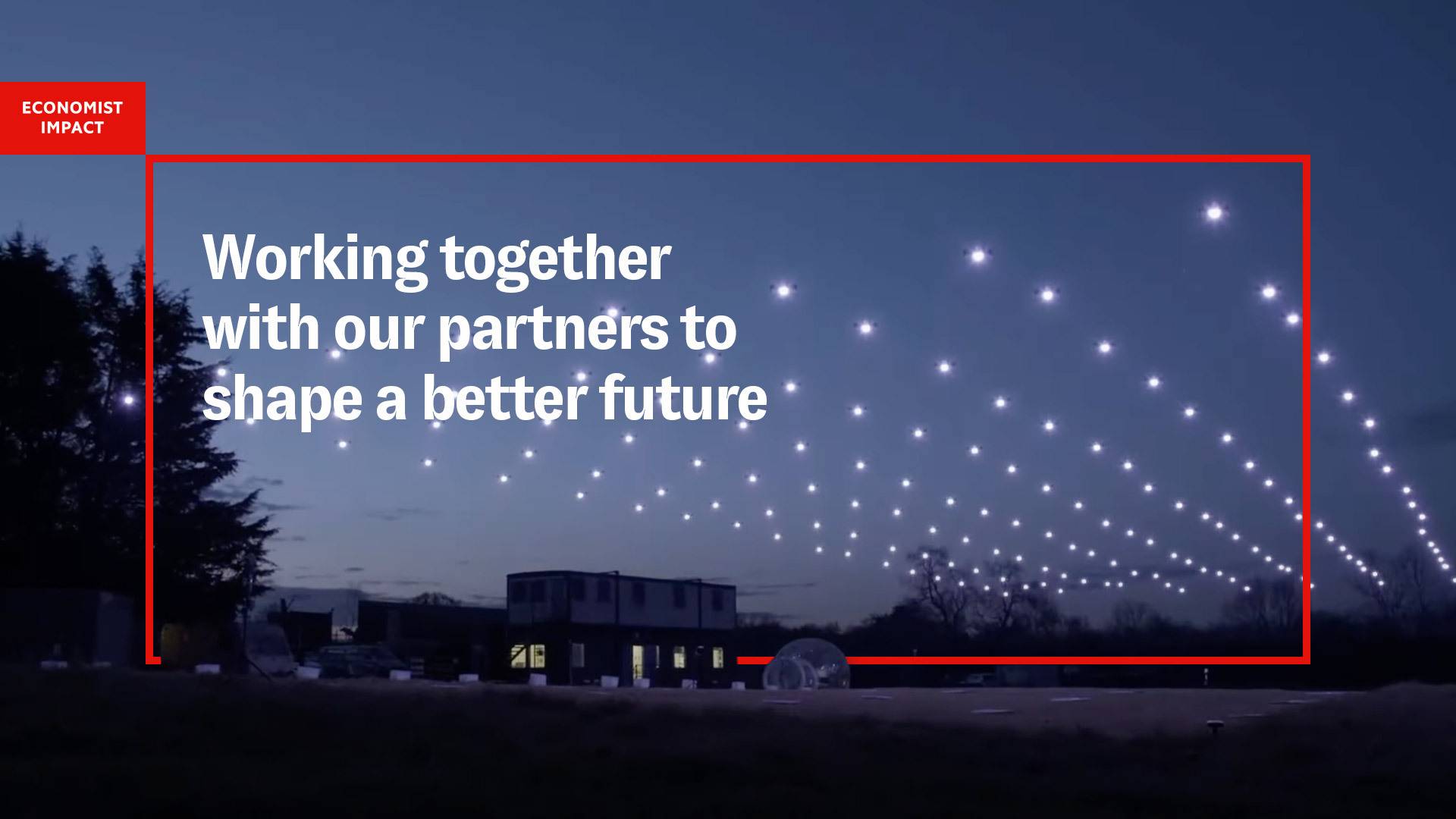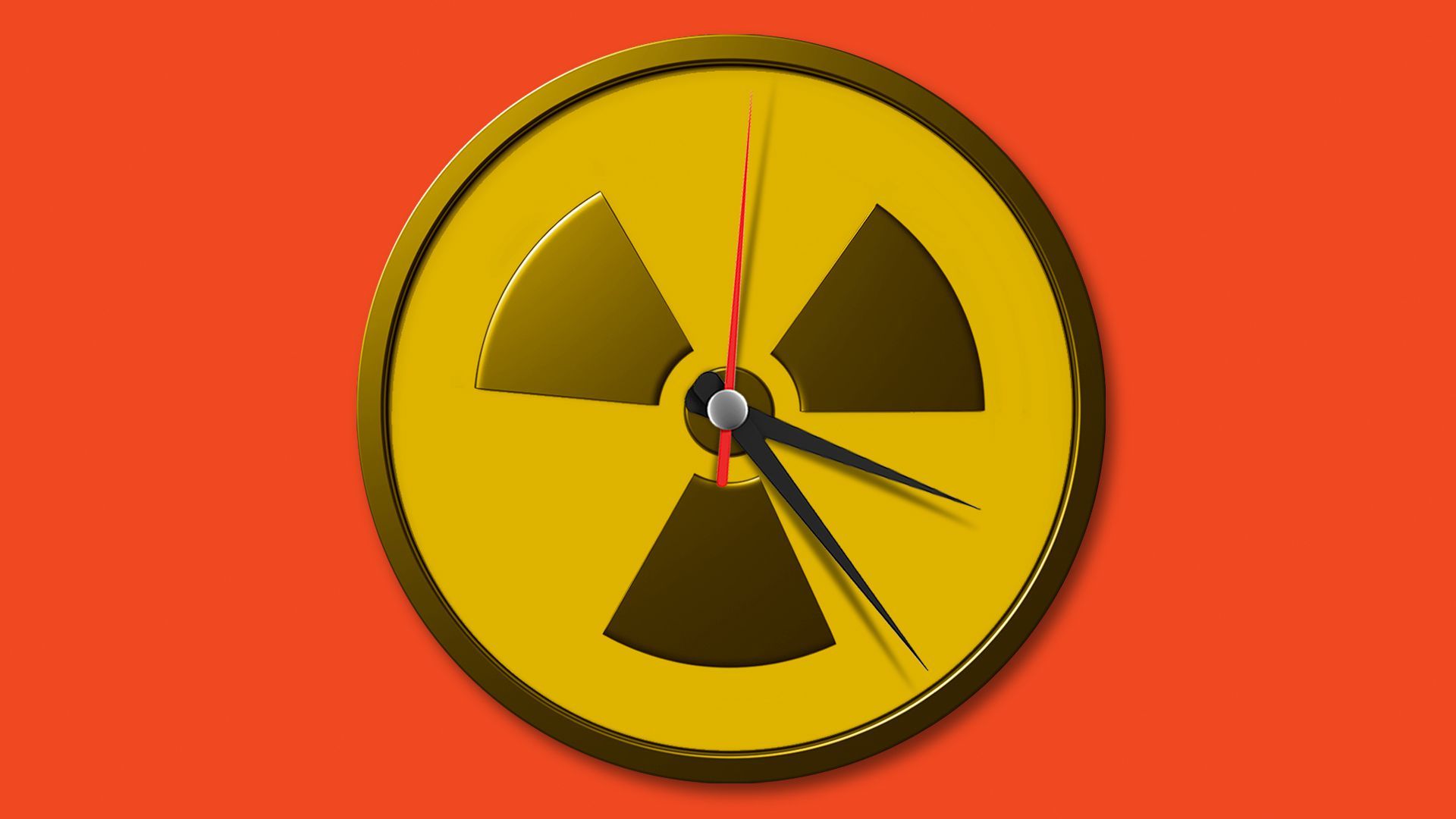| | | | | | | Presented By Economist Impact | | | | Axios World | | By Dave Lawler ·Mar 03, 2022 | | Welcome back to Axios World. - Tonight's edition (1,907 words, 7 minutes) takes us from the battlefield to a Moscow protest to a refugee camp and finally to the nuclear negotiations in Vienna.
- Heads-up: The new season of our "How it Happened" podcast is about Putin's invasion of Ukraine. I'll be your host. Check out the trailer and subscribe before the first episode drops on Saturday.
Situational awareness: There's a fire at the massive nuclear power plant in Zaporizhzhia, Ukraine, following fighting there, the town's mayor said (per Reuters). | | | | | | 1 big thing: How it ends |  | | | The man with the long table. Photo: Russian Presidency handout via Getty | | | | Russia's invasion of Ukraine could destroy Ukraine's sovereignty or Vladimir Putin's regime. The outlines of a solution that leaves both intact are murkier. The big picture: Putin has failed to force a quick capitulation from Kyiv. Now, even if he ultimately succeeds in removing President Volodymyr Zelensky, he'll almost certainly face a prolonged, well-armed and motivated insurgency — a bad outcome for Russia and a worse one for Ukraine. Still, Putin's demands and demeanor — denouncing Zelensky's administration as "Nazis" and insisting on the full "demilitarization" of a country he is currently invading — are not those of man who's ready to cut a deal. - Putin's calculus will only change if he comes under sufficient pressure at home — due to battlefield casualties and economic hardship — that he feels continuing the war is more perilous for him than ending it, says Richard Haass, president of the Council on Foreign Relations.
Even in such a scenario, it's unclear what exit Putin might be willing to take. - Putin's other core demand, that Ukraine declare itself neutral and rule out future membership in NATO, has long been a nonstarter in Kyiv. It's unclear whether battlefield realities could change that.
- But having described his mission in Ukraine as one of "de-Nazification" (however absurd that may be), and spoken at length about Ukraine's rightful place in Russia's orbit, Putin would seem to have set the bar for success, at minimum, at the installation of a loyal government.
- There, Putin does have an advantage, however. His control over Russian media is such that he might believe he can sell a modest outcome — a new status for the eastern "republics" and a promise on NATO, perhaps — as a victory, despite the high costs.
On the one hand: Rep. Adam Smith (D-Wash.) is among those arguing that the U.S. should set out the circumstances under which sanctions will be lifted in order to provide Putin with an off-ramp. On the other: Radek Sikorski, the Polish chair of the European Parliament's EU-USA delegation, told Axios that the goal of Western sanctions should now be regime change, calling Putin "a criminal who's threatening us with nuclear war." Either way, the West's focus right now should not be on diplomacy, Haass says. It should be increasing the costs on Putin. Driving the news: In a second round of peace talks near the Ukraine-Belarus border today, the Ukrainian and Russian delegations reached a tentative deal to organize humanitarian corridors for fleeing civilians, but made no progress toward ending the war. Afterward, Zelensky challenged Putin to meet him one-on-one. - "It is not that I want to talk with Putin. I think I have to talk with Putin. The world has to talk with Putin because there are no other ways to stop this war," he said.
Meanwhile, Putin held a 90-minute call with French President Emmanuel Macron in which he not only refused to budge on his demands but promised to add more if Ukraine continued to fight. - A French official offered reporters this ominous analysis: "Russia's ambition is indeed to take control of all of Ukraine."
|     | | | | | | 2. State of the war |  Data: Institute for the Study of War; Map: Jared Whalen/Axios Russia has claimed its first major city and sent 90% of its amassed forces into the fight, but it doesn't yet have dominance in the skies. Where things stand: Axios' Zach Basu breaks down Russia's four primary lines of attack. 1. Russia's primary goal continues to be the encirclement of Kyiv, where Zelensky and his team have bunkered down amid hourly air raid sirens. - The menacing 40-mile Russian convoy captured on satellite imagery has been "stalled" about 19 miles north of Kyiv for several days due to food and fuel shortages, muddy roads, and Ukrainian attacks, according to U.S. and U.K. officials.
- Still, the numbers are in Russia's favor. Asked if the Ukrainian forces could fend off the Russians, Zelensky admitted today, "I don't know."
2. Russian forces are also seeking to encircle Kharkiv, Ukraine's second city near the Russian border. - They have bombed civilian areas and appear to be preparing for a siege, but have faced fierce resistance in a week of heavy fighting.
- "Kharkiv today is the Stalingrad of the 21st century," Zelensky said, accusing Russia of "undisguised terror."
3. In southern Ukraine, Russian forces have surrounded the strategic port city of Mariupol and engaged in a continuous assault for more than 30 hours. - The city of 400,000 has no electricity or running water and has been completely blockaded, according to the deputy mayor, who estimated 200 civilians had been killed.
- Seizing control of Mariupol would advance Russia's longtime goal of building a "land bridge" to Crimea.
4. West of Crimea, the mayor of Kherson conditionally surrendered to Russian troops — making it the first major population center to fall. - The capture of Kherson will allow Russian forces to continue their advance toward Mykolaiv and Odessa, which — if successful — would completely cut off Ukraine's access to the seas, according to the Institute for the Study of War.
What to watch: CNA's Michael Kofman says today may have been a "turning point" in terms of Russia's use of air power. He expects more airstrikes going forward. |     | | | | | | 3. View from a Moscow protest |  | | | A protester disputes with police officers who detained him during a protest in Pushkinskaya Square on Feb. 27 in Moscow. Photo: Konstantin Zavrazhin/Getty Images | | | | Freelance journalist Yana Pashaeva attended a protest in Moscow on Sunday. She spoke to Axios' Alison Snyder about the fear and anger she saw on the streets: On the ground: Protesters would normally have gathered in Pushkin Square but, deterred by the police and detention buses there, Pashaeva and others met instead outside the Ministry of Foreign Affairs. - The protests are largely leaderless, and due to the risk of arrest, participants typically don't carry banners or chant, Pashaeva says. "It is basically a silent protest."
As they moved through the streets toward the Cathedral of Christ the Savior, there was "a chaotic scene of policeman running toward you and people running away from them," she recalls. - Some people ran into a supermarket to hide, others tried to make themselves invisible, standing along a wall.
- "But the police would grab them by the elbow and ask them to go with them," she says. "And you don't resist."
The crowd split as people ran from police through the narrow streets, but hundreds regrouped at another square. - Feeling that they were now safe, they started to chant "no to war!"
- Then the police reappeared and blocked the path of the protesters. Protesters were again chased through the streets, and the unlucky ones were taken onto the detention buses. Pashaeva hid behind a column outside a restaurant.
- Most arrests don't end in violence, she says, as long as the protester doesn't resist arrest or question the police officer. But people do face large fines and possibly criminal charges.
Zoom out: More than 8,000 protesters have been arrested across Russia over the past week, according to OVD-Info, a Russian human rights watchdog. The big picture: Protests are drawing thousands, but Pashaeva says many people are afraid to demonstrate, despite their anger with Putin. - "It is dangerous to protest, but I feel bad sitting in my home and doing nothing about the situation," she says.
What to watch: Jailed Russian opposition leader Alexei Navalny yesterday called for daily protests in the country. - Russia's prosecutor general announced "that participation in 'allegedly peaceful' anti-war 'actions' can be qualified as participation in the activities of an extremist organization (punished by imprisonment for up to six years)," Russian news outlet Meduza reports.
|     | | | | | | A message from Economist Impact | | How insight, innovation and influence lead to impact | | |  | | | | Economist Impact combines policy research, global events, innovative design and creative story-telling to turn ideas into action. The goal: Catalyse growth and change in the world. For expert commentary, innovation and thought leadership, follow Economist Impact on LinkedIn. | | | | | | Bonus: Where in the world? |  | | | Screenshot via Apple Maps | | | | Today we're visiting nine peninsulas. Can you name them? Scroll to the bottom for the answer. |     | | | | | | 4. View from a Polish refugee camp |  Data: UNHCR; Map: Jared Whalen and Will Chase/Axios Axios' Sarah Mucha has been speaking this week with staff and volunteers at Proem Ministries, a Christian organization in central Poland that is standing up a refugee camp and war orphanage for fleeing Ukrainians. On the ground: As of Thursday morning, the camp was bulging with 154 refugees — 86 children, 54 women and 14 men — and bracing for the arrival of hundreds of children who have lost their parents. - A facility that was once used for summer camp is now temporary housing for refugees, who are then offered rooms in volunteers' homes.
- The ministry is scrambling to provide for the refugees' needs: grocery vouchers, cellphone SIM cards, child care, health and psychological care, even job opportunities.
The camp's horses have become an unexpected diversion for children who arrived talking about missiles, tanks and explosions. - Art is another form of therapy for the children. Most of their drawings depict the Ukrainian flag or are colored in yellow and blue.
What they're saying: Pastor Rafal Piekarski told Sarah he felt both overwhelmed and filled with a sense of purpose. - "I think people turned panicking into helping because they are giving even more than there's needed," said Karolina Kupczyk, a Proem teacher and staff member.
Between the lines: Several locals affiliated with the ministry have personal connections to Ukraine and the refugees. - Olena Kertowska, who moved to the Warsaw area seven years ago with her Polish husband, awoke last Thursday to a barrage of anxious texts from family in Kharkiv. Russia had invaded. "I couldn't breathe," she told Axios.
- One of her sisters made a harrowing journey to Poland with her husband and three young children. Her parents, grandparents and another sister remain in Kharkiv.
The big picture: At least 1 million refugees have already fled Ukraine to neighboring countries. Brussels says they will have the right to live and work in the EU for up to three years. Go deeper. |     | | | | | | 5. Macron enters presidential race as the favorite |  Data: IFOP; Chart: Thomas Oide/Axios French President Emmanuel Macron finally made it official today: He will seek a second term. State of play: Macron's approval rating is only around 40%, his two immediate predecessors weren't re-elected, and polls had long foreshadowed a hard-fought race. But things are looking up for Macron. - With the conservative vote split three ways, Macron is likely to win the first round (April 10) and enter the second round (April 24) as a heavy favorite.
- He leads Marine Le Pen by 13 points in head-to-head polling and his other potential rivals by even more.
|     | | | | | | 6. One to watch: Iran deal revival could be days away |  | | | Illustration: Annelise Capossela/Axios | | | | With the restoration of the Iran nuclear deal potentially just days away, the head of the UN's nuclear watchdog will travel to Tehran on Saturday to try to resolve a dispute over an investigation into Iran's undeclared nuclear activity, Axios' Barak Ravid writes. Why it matters: Iran says it won't return to compliance with the 2015 accord unless the probe is shut down, so the success or failure of Rafael Grossi's visit could determine the fate of the deal. Driving the news: All participants in the Vienna talks have been stressing that a deal is very close but that some issues remain unresolved. - French negotiator Philippe Errera posted a photo of the European negotiating team and thanked them for their work over the past 11 months, in a possible signal that talks are concluding.
- Iranian Foreign Ministry spokesperson Saeed Khatibzadeh tweeted that regardless of the positive rumblings, "Nobody can say the deal is done until all the outstanding remaining issues are resolved."
What to watch: The biggest hurdle appears to be the IAEA investigation, which the Western powers have said can't be shut down until the agency's concerns are addressed. - Grossi's visit is intended to find a formula that all sides can live with.
|     | | | | | | 7. Stories we're watching |  Data: United Nations; Map: Danielle Alberti/Axios - How countries voted on UN resolution condemning Russia
- Costa Rica legalizes medical marijuana
- Thousands evacuate deadly floods in Australia
- Nigerian women protest parliament rejection of pro-equality bills
- Hundreds of African migrants cross into Spain's Melilla
- Trump's border wall breached by smugglers over 3,000 times
- Hollywood boycotts Russia
Quoted: "I hope the sky will be shut down. If you don't have strength and courage to do that, then give me the planes." — Zelensky today reiterating his plea for a no-fly zone from NATO. Here's our explainer on why he won't get one. |     | | | | | | A message from Economist Impact | | How insight, innovation and influence lead to impact | | |  | | | | Economist Impact combines policy research, global events, innovative design and creative story-telling to turn ideas into action. The goal: Catalyse growth and change in the world. For expert commentary, innovation and thought leadership, follow Economist Impact on LinkedIn. | | | | Answers: 1. Iberian; 2. Cape Bon; 3. Peloponnese; 4. Gallipoli; 5. Crimea; 6. Sinai; 7. Arabian; 8. Horn of Africa/Somali Peninsula; 9. Kathiawar. |  | It's called Smart Brevity®. Over 200 orgs use it — in a tool called Axios HQ — to drive productivity with clearer workplace communications. | | | | | | Axios thanks our partners for supporting our newsletters. If you're interested in advertising, learn more here.
Sponsorship has no influence on editorial content. Axios, 3100 Clarendon Blvd, Suite 1300, Arlington VA 22201 | | | You received this email because you signed up for newsletters from Axios.
Change your preferences or unsubscribe here. | | | Was this email forwarded to you?
Sign up now to get Axios in your inbox. | | | | Follow Axios on social media:    | | | | | |












No comments:
Post a Comment